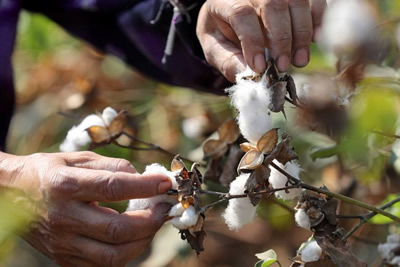World Cotton Day highlights cotton's enormous potential to contribute to poverty reduction and sustainable, equitable development.
You are rarely too far from something made of or containing cotton.
In clothing, linens, furniture, mattresses, vehicles, dollar bills and much more, cotton is always around us. It’s the most abundantly produced natural fibre in the world, yet we rarely celebrate it.
That is set to change on 7 October, when UNCTAD and its partners will mark the first World Cotton Day in Geneva, Switzerland, in a global celebration of cotton’s contributions to people’s lives, both as a fibre and a source of livelihood.
“Cotton’s many industrial applications make it an ideal foundation for upgrading and diversification strategies that allow producing countries to benefit more from trade,” UNCTAD Secretary-General Mukhisa Kituyi said.
Incomes for 100 million families
Approximately 26 million farmers grow cotton, in 75 countries. Growing cotton and processing it into, for example, textiles and apparel, provides jobs and incomes to approximately 100 million families worldwide.
Cotton is a drought-resistant crop, providing reliable income to farmers in areas where agriculture is under serious threat from climate change and/or recurrent drought.
Cotton occupies just 2.1% of the world’s arable land, yet it meets 27% of the world’s textile needs. It is also one of the most important traded commodities, with an annual traded value of approximately US$8 billion.
The cotton value chain is long, with multiple processing steps, leading to investment, job creation and industrial upgrading.
Founding partner
UNCTAD is a founding partner of World Cotton Day, alongside the Food and Agriculture Organization, the International Cotton Advisory Committee, the International Trade Centre (ITC) and the World Trade Organization (WTO).
The 7 October event to be hosted by the WTO responds to a draft resolution submitted by Benin, Burkina Faso, Chad and Mali (the "Cotton-4" countries) to the UN General Assembly for recognition of a World Cotton Day, reflecting the importance of cotton as a global commodity.
World Cotton Day matters to developing countries by highlighting cotton’s enormous potential to contribute to poverty reduction and economic development.
With two thirds of developing countries dependent on exports of commodities, a core part of UNCTAD’s work involves building countries’ capacity to move up the value chain and diversify their exports.
Through its technical cooperation work, UNCTAD has assisted cotton-producing countries, mainly in Africa, to improve their yields, meet international standards and attract investments in value-added industries.”
“More can be done to realise the development potential of cotton, especially in Africa,” Dr. Kituyi said. “Trade negotiations must foster regional integration and provide equitable trading opportunities for producing countries, big and small.”
Unlocking the hidden value of by-products
Cotton is grown mainly for its fibre, or lint - the raw material in cotton textiles. But commercial applications exist for other parts of the cotton plant, such as the stalks, husks, cottonseed and short-staple fibres.
“These by-products represent an opportunity for producing countries to unlock further benefits from cotton production,” said Kris Terauds, economic affairs officer at UNCTAD.
Despite many efforts to enhance local value addition, integrated cotton-to-textile value chains in Africa are currently inactive or absent.
Given the continued difficulty in reviving textile and apparel industries in Africa, cotton by-products represent potential additional income streams that can improve resilience.
UNCTAD is building on its earlier work for cotton-producing countries with a new joint initiative with the WTO and ITC on cotton by-products.
Benefiting from the three “sister” trade organizations’ complementary mandates and expertise on cotton, the joint initiative seeks to assist African cotton-producing countries in adding more value to their cotton.
The initiative responds to requests by developing countries, notably the "Cotton-4" countries and other cotton-producing countries in Africa, for technical assistance to develop value chains and markets for cotton by-products.
New income streams, more added value
“Diversification into cotton by-products has the potential to create socio-economic benefits,” Mr. Terauds said.
The initiative aims to provide new income streams for farmers and processors, create jobs, increase domestic value added, open access to new markets and reduce waste in the cotton value chain.
Additional income would insulate farmers from the fluctuations of international lint prices, encourage them to grow more cotton and thereby help redress the raw material challenge faced by many value-added processing businesses in Africa.
The initiative also seeks to promote equitable trading opportunities and improved trade balance through increased exports or import substitution.
The Enhanced Integrated Framework funded the first phase of work, involving a feasibility study to identify priority cotton by-products for development in the eight beneficiary countries. These are the "Cotton-4" countries as well as Mozambique, Uganda, Tanzania and Zambia.
The study and related dissemination workshops will be implemented through 2020 and will inform subsequent phases of work.

